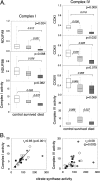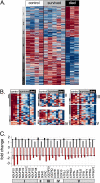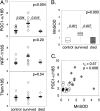Survival in critical illness is associated with early activation of mitochondrial biogenesis
- PMID: 20538956
- PMCID: PMC2949402
- DOI: 10.1164/rccm.201003-0326OC
Survival in critical illness is associated with early activation of mitochondrial biogenesis
Abstract
Rationale: We previously reported outcome-associated decreases in muscle energetic status and mitochondrial dysfunction in septic patients with multiorgan failure. We postulate that survivors have a greater ability to maintain or recover normal mitochondrial functionality.
Objectives: To determine whether mitochondrial biogenesis, the process promoting mitochondrial capacity, is affected in critically ill patients.
Methods: Muscle biopsies were taken from 16 critically ill patients recently admitted to intensive care (average 1-2 d) and from 10 healthy, age-matched patients undergoing elective hip surgery.
Measurements and main results: Survival, mitochondrial morphology, mitochondrial protein content and enzyme activity, mitochondrial biogenesis factor mRNA, microarray analysis, and phosphorylated (energy) metabolites were determined. Ten of 16 critically ill patients survived intensive care. Mitochondrial size increased with worsening outcome, suggestive of swelling. Respiratory protein subunits and transcripts were depleted in critically ill patients and to a greater extent in nonsurvivors. The mRNA content of peroxisome proliferator-activated receptor γ coactivator 1-α (transcriptional coactivator of mitochondrial biogenesis) was only elevated in survivors, as was the mitochondrial oxidative stress protein manganese superoxide dismutase. Eventual survivors demonstrated elevated muscle ATP and a decreased phosphocreatine/ATP ratio.
Conclusions: Eventual survivors responded early to critical illness with mitochondrial biogenesis and antioxidant defense responses. These responses may partially counteract mitochondrial protein depletion, helping to maintain functionality and energetic status. Impaired responses, as suggested in nonsurvivors, could increase susceptibility to mitochondrial damage and cellular energetic failure or impede the ability to recover normal function. Clinical trial registered with clinical trials.gov (NCT00187824).
Figures




Comment in
-
Peroxisome proliferator-activated receptors gamma coactivator-1alpha: master regulator of mitochondrial biogenesis and survival during critical illness?Am J Respir Crit Care Med. 2010 Sep 15;182(6):726-8. doi: 10.1164/rccm.201005-0695ED. Am J Respir Crit Care Med. 2010. PMID: 20833826 No abstract available.
References
-
- Angus DC, Wax RS. Epidemiology of sepsis: an update. Crit Care Med 2001;29:S109–S116. - PubMed
-
- Abraham E, Singer M. Mechanisms of sepsis-induced organ dysfunction. Crit Care Med 2007;35:2408–2416. - PubMed
-
- Hotchkiss RS, Karl IE. The pathophysiology and treatment of sepsis. N Engl J Med 2003;348:138–150. - PubMed
-
- Leverve XM. Mitochondrial function and substrate availability. Crit Care Med 2007;35:S454–S460. - PubMed
Publication types
MeSH terms
Substances
Associated data
Grants and funding
LinkOut - more resources
Full Text Sources
Other Literature Sources
Medical

